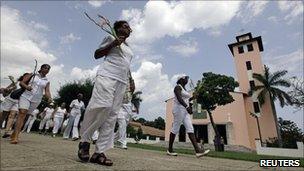Cuba dissident Guido Sigler released without exile
- Published

The Ladies in White group in Cuba has vowed to keep protesting until all dissidents to be freed
Cuba has released a prominent political prisoner, Guido Sigler, who had refused to go into exile in Spain.
His release came hours after the Roman Catholic Church said both he and fellow dissident Angel Moya were to be freed.
The two men were among 52 jailed dissidents the communist authorities agreed to release last July in a deal brokered by the Church.
The majority were quickly released, but 11 were kept behind bars because they refused to leave Cuba.
Mr Sigler arrived at his home in a village outside the central city of Matanzas on Friday afternoon, dissident groups said.
Under the agreement announced on Friday, Mr Moya is being allowed to stay in Cuba, while Mr Sigler "has indicated a desire to go to the US", Church spokesman Orlando Marquez said.
The BBC's Michael Voss in Havana says the move suggests the prisoner release programme is back on track.
Mr Moya is the husband of Bertha Soler, one of the leaders of the Ladies in White opposition group.
"I am happy, as it is good news," Ms Soler told Associated Press. "But I am not totally satisfied because of the government's drip-drip approach" to letting the dissidents out.
The men had been in jail since 2003, when they were arrested along with 73 other opposition figures in a mass government crackdown.
Two other remaining prisoners began a hunger strike earlier this week.
The Cuban authorities generally refer to the detained dissidents as common criminals or mercenaries paid by Washington to destabilise the communist system.
The release of political prisoners has been a key demand of the US and EU if economic ties are to be improved.
- Published8 November 2010
- Published29 January 2011
- Published16 July 2010